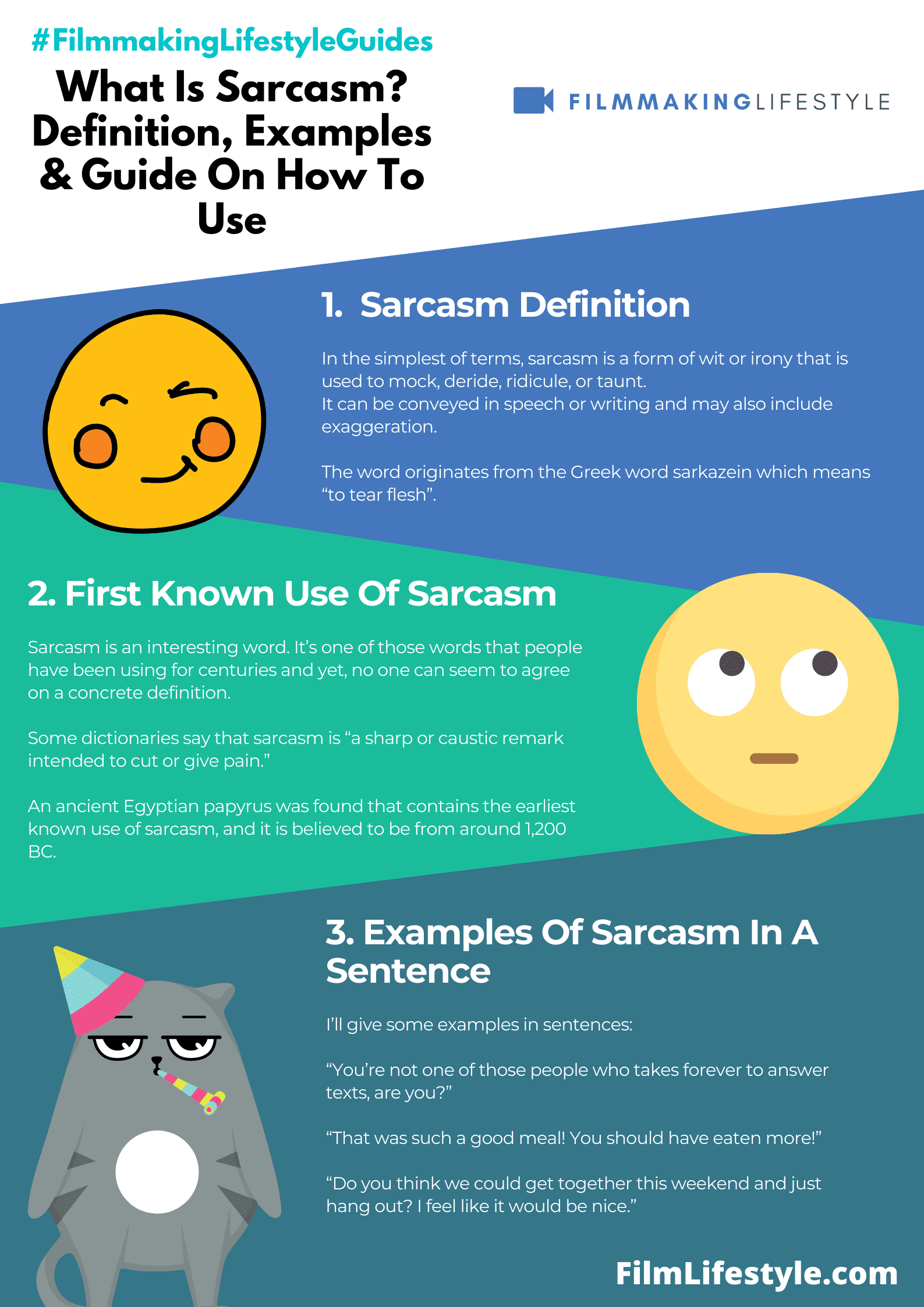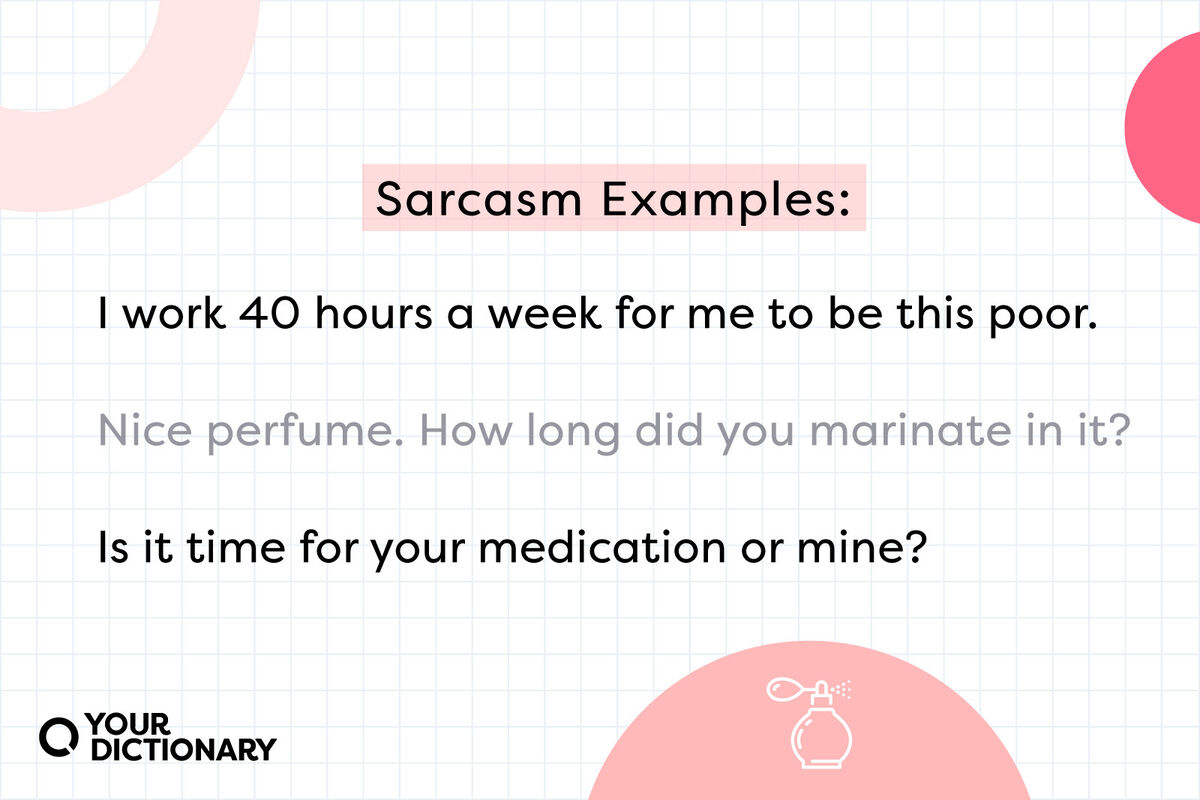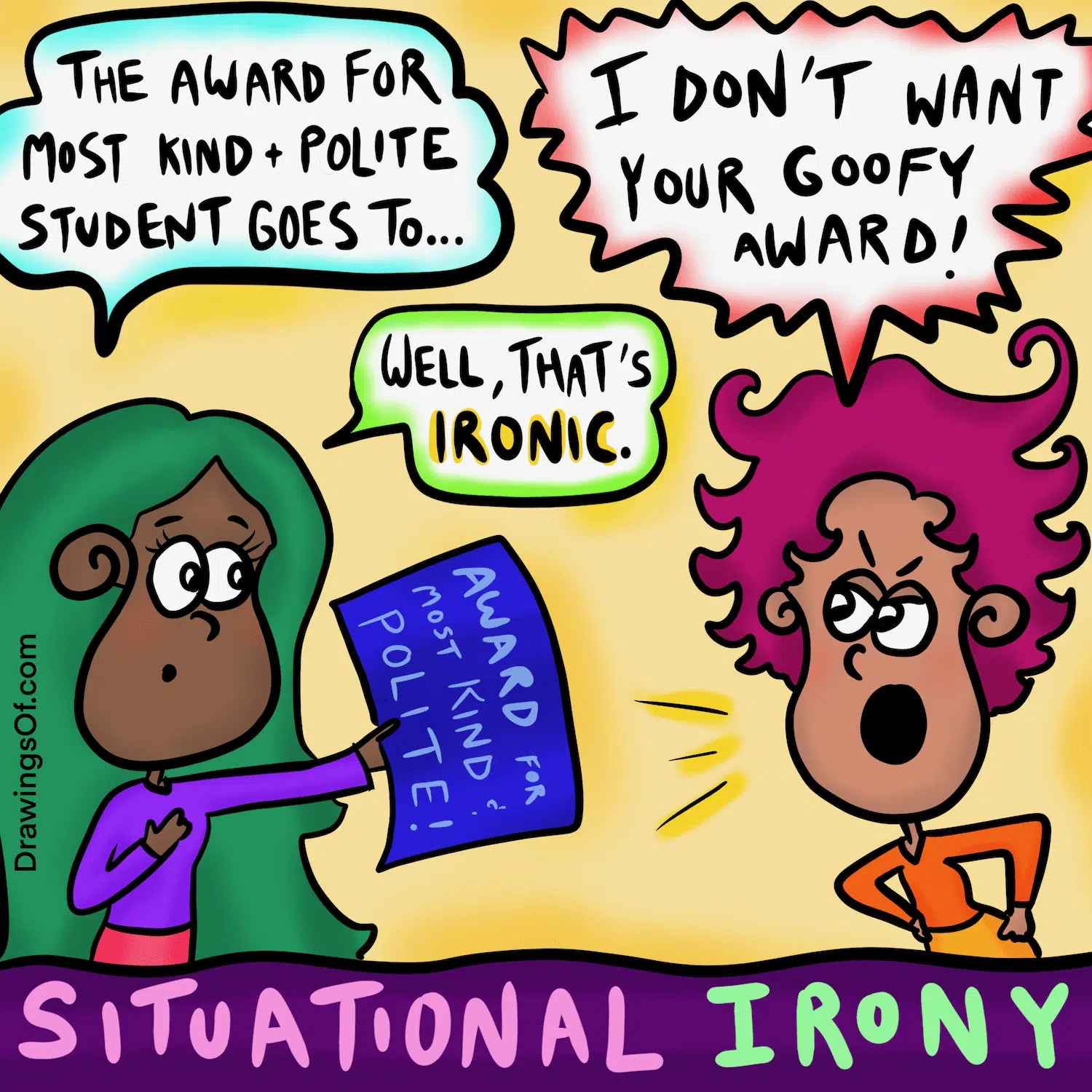Sarcastic Meaning - What It Really Says
It's quite something, isn't it, how words can sometimes carry a message that is the exact opposite of what they seem to say on the surface? We hear it, we use it, and we might even feel it sting a little, that peculiar way of speaking where the real point hides just beneath the obvious phrasing. This particular manner of expression, often known as sarcasm, is a common feature in our daily chats and written exchanges, so it's almost a part of how we communicate, actually.
You might have noticed how a person can utter a seemingly pleasant phrase, yet their tone or the circumstances make it clear they mean something completely different, perhaps even something cutting. This curious twist in communication is what gives sarcastic remarks their unique flavor, and it’s a form of verbal play that can be quite powerful, in some respects.
Exploring the core of this kind of talk means looking at why we choose to speak this way, what feelings it aims to bring out, and how we can tell when someone is using it. It’s a way of saying one thing while truly conveying another, whether for a quick laugh, a pointed comment, or to show a bit of frustration, you know, just a little.
Table of Contents
- What's the True Heart of Sarcastic Meaning?
- Why Do People Choose a Sarcastic Meaning?
- How Does Sarcastic Meaning Show Itself?
- Is There a Difference in Sarcastic Meaning from Other Similar Ideas?
- The Punch of Sarcastic Meaning
- Spotting Sarcastic Meaning in Daily Talk
- The Way Words Carry Sarcastic Meaning
- The Many Shades of Sarcastic Meaning
What's the True Heart of Sarcastic Meaning?
At its very core, the idea of sarcastic meaning involves a speaker expressing words that are quite contrary to their actual thoughts or feelings. It’s like saying, "Oh, you did a wonderful job," when someone has, in fact, made a complete mess of things. The actual message isn't about praise at all; it’s about pointing out a failing, perhaps even with a touch of sharp humor. This kind of communication often carries a sense of bitterness or a desire to make a strong impression, almost like a verbal jab. It's a way of delivering a message indirectly, often with a hint of something that cuts or stings, you know, just a little bit.
When someone speaks with sarcastic meaning, they are, in essence, playing with words, using them to create a contrast between what is said and what is truly meant. This contrast is what gives the statement its special effect. It's not just about saying the opposite; it’s about the feeling or purpose behind that opposite statement. This can be to poke fun, to criticize, or to show a certain level of annoyance. It’s a subtle yet powerful tool in how we communicate, and it requires the listener to pick up on cues beyond the simple words themselves, such as tone of voice or the situation at hand. So, it's really about the unspoken message that comes through, isn't it?
The essence of sarcastic meaning, then, is this deliberate reversal of literal sense to convey a hidden, often critical, message. It's a verbal dance where the true intent is masked by an outwardly different statement. This particular form of expression is marked by a certain sharpness, a biting edge that can make its point quite clear without being overly direct. It's like a secret handshake between the speaker and the listener, where both understand that the surface words are just a cover for a deeper, more pointed truth. You might say it's a clever way to get a point across, even if it sometimes feels a bit harsh.
Why Do People Choose a Sarcastic Meaning?
People often choose to use sarcastic meaning for a variety of reasons, and it’s not always about being mean-spirited. Sometimes, it's a way to express frustration or annoyance without directly confronting someone. For instance, if a friend is consistently late, you might say, "Wow, you're incredibly punctual today," when they finally arrive an hour behind schedule. This remark, with its sarcastic meaning, conveys your irritation more subtly than an outright scolding. It's a way to show irritation, or perhaps just a little bit of exasperation, without having to spell it out directly, you know.
Another common reason for employing sarcastic meaning is to mock or insult someone. This is where sarcasm can become quite pointed and, at times, hurtful. By saying the opposite of what is true, the speaker can highlight a person's flaws or foolishness in a way that can feel quite cutting. For example, if someone makes a really obvious mistake, a sarcastic comment like, "That was truly brilliant thinking," serves to ridicule their poor judgment. It's a form of verbal attack, really, that aims to make the other person feel small or foolish, and it can be very effective, too.
Beyond criticism and insult, sarcastic meaning can also be used for humor. Sometimes, the intent is simply to be funny, to create a laugh through the unexpected contrast between what is said and what is meant. This kind of playful sarcasm often requires a good relationship between the speaker and listener, as well as a shared sense of humor, to be received well. It's a way to add a bit of wit to a conversation, making light of a situation or a person's actions. So, it's not always about causing pain; sometimes, it’s just about being clever and getting a chuckle, which is that.
How Does Sarcastic Meaning Show Itself?
The way sarcastic meaning makes itself known isn't just through the words themselves; it's very much about how those words are delivered. A person's tone of voice is a huge giveaway. For example, a flat, exaggerated, or overly sweet tone can signal that the speaker means the exact opposite of their words. Imagine someone saying, "What a truly fantastic idea!" with a drawn-out sigh and a deadpan voice; you'd instantly pick up on the hidden sarcastic meaning, wouldn't you? This vocal coloring is almost always present when someone is trying to be sarcastic, you know, just to make sure the message gets through.
Beyond voice, a sarcastic meaning can also be communicated through non-verbal cues. A particular facial expression, like a raised eyebrow, a slight eye-roll, or a wry smile, can completely change the interpretation of a seemingly innocent statement. She gave him a sarcastic smile, for instance, which tells us that her pleasant expression was actually hiding a sharp, perhaps critical, thought. These visual signals work in tandem with the words to ensure the listener understands the true, underlying message, which is often quite different from the literal statement. It’s like a secret code, really, that you have to learn to read, and it's quite common, too.
The situation itself also plays a significant role in how sarcastic meaning is understood. If someone makes a remark that seems out of place or overly positive in a negative situation, it’s likely carrying a sarcastic edge. For example, if a project has gone completely wrong, and someone says, "Well, that went perfectly," the context makes it clear that the statement is meant to be sarcastic. The contrast between the words and the reality of the moment makes the true intention obvious. So, it’s a combination of words, how they sound, and the situation they are spoken in that helps us grasp the full sarcastic meaning, which is that.
Is There a Difference in Sarcastic Meaning from Other Similar Ideas?
It’s easy to mix up sarcastic meaning with other ways of speaking that also involve a bit of a twist, like being ironic or satiric. While they share some common ground, there are distinct qualities that set sarcastic meaning apart. Sarcasm, at its core, often implies an intentional effort to cause a feeling of discomfort or to put someone down by making fun of them, teasing them, or making them seem foolish. It's generally more direct in its aim to sting or cut, even if it uses indirect language, you know, like a hidden jab.
Irony, on the other hand, is a broader idea where there's a contrast between what is expected and what actually happens, or between what is said and what is meant, but without the same strong intent to hurt or mock. For example, it’s ironic if a fire station burns down. There’s no deliberate attempt to insult or wound in that situation; it’s just a surprising twist of events. While sarcasm is a form of verbal irony, not all verbal irony is sarcastic. The key difference lies in the underlying purpose: sarcasm almost always carries an edge of criticism, scorn, or a desire to make a point that bites, which is that.
Satire is another related concept, but it's usually on a larger scale. Satire uses humor, irony, or exaggeration to criticize people's foolishness or vices, particularly in politics or society. It aims to bring about change by exposing flaws, often through a story or a performance. While satire can use sarcastic meaning within its framework, its overall goal is typically broader and more public. Sardonic, a term also mentioned, is very close to sarcastic but often suggests a deeper, more bitter, or cynical kind of humor or scorn. So, while these terms are related, sarcastic meaning stands out for its focused, often personal, intent to deliver a sharp, opposite message, sometimes to cause a little pain, you know.
The Punch of Sarcastic Meaning
The impact of sarcastic meaning can be quite strong, often leaving a lasting impression on the person it's aimed at. When someone uses remarks that clearly mean the opposite of what they say, especially with the goal of causing a bit of hurt, it's a powerful tool. This kind of talk is designed to make someone feel small or foolish by openly making fun of them, or perhaps teasing them in a way that's not kind, or even just making them look silly in front of others. It's a way of putting someone in their place without being overtly aggressive, you know, just a bit of a subtle attack.
This "punch" can be felt when the speaker implies an intentional effort to bring about discomfort. It’s not just about expressing a different opinion; it’s about making a statement that carries a certain weight of disapproval or scorn. For example, if someone has been boasting endlessly about a minor achievement, a sarcastic remark like, "Oh, your genius truly knows no bounds," is meant to deflate their ego and highlight their excessive pride. The sting comes from the contrast between the seemingly complimentary words and the clear underlying message of ridicule, which is that.
The effectiveness of sarcastic meaning in delivering this punch comes from its indirect nature. Because the words themselves are not directly insulting, the target might feel a mix of confusion and irritation, having to figure out the true intent. This can be more unsettling than a direct insult, as it forces the recipient to confront the hidden criticism. It’s a verbal maneuver that relies on the listener's ability to pick up on cues and decode the real message, making the impact all the more personal when it lands. So, it's a very clever way to deliver a blow, sometimes a quite painful one, too.
Spotting Sarcastic Meaning in Daily Talk
Recognizing sarcastic meaning in everyday conversations often comes down to paying attention to more than just the literal words. It's about listening for that slight shift in tone, noticing a particular facial expression, or considering the context of the situation. For instance, if a person consistently talks about their business ventures with a certain level of bitterness after experiencing their own failures, their comments about other people's successes might carry a sarcastic meaning. His business failures made him sarcastic about other people's ventures, which tells us that his past experiences shaped his way of speaking, making his remarks about others' triumphs tinged with a sharp, hidden meaning, you know.
Another common way to spot sarcastic meaning is when someone says something that is obviously untrue or exaggerated in a given circumstance. If it’s pouring rain outside, and someone exclaims, "What a beautiful, sunny day!" you immediately understand that they are not being serious. The stark contrast between their words and the actual weather conditions signals the sarcastic intent. It’s a very common way that people use this form of expression, and it's quite easy to pick up on, actually.
Sometimes, the very bluntness of a statement, combined with a particular delivery, can also reveal a sarcastic meaning. If someone says, "There's no need to be sarcastic," it implies that the speaker has already recognized the hidden, critical message behind the words spoken to them. This shows that the sarcastic meaning was clear enough to be called out directly. So, it’s about picking up on those subtle clues – the way someone says something, their look, or the situation itself – that helps us figure out if a statement carries a sarcastic edge, which is that.
The Way Words Carry Sarcastic Meaning
The very way words are put together plays a central part in how sarcastic meaning is conveyed. It's a form of verbal irony where a person uses words that are intended to convey the exact opposite of what is truly being spoken. This isn't just a random choice of words; it's a deliberate act to criticize, or perhaps to insult someone, or to show a level of irritation, or even just to be funny. The power of sarcasm lies in this clever twist of language, where the surface message is a decoy for the deeper, often biting, truth, you know, just a little bit.
When someone is being sarcastic, they are, in essence, making a statement that is contrary to their true intent or meaning. They are aiming to achieve a specific effect, whether that's humor, a pointed criticism, or a form of satire. The words themselves might seem innocent, but the speaker's real purpose is to deliver a message that is quite different from the literal interpretation. This makes the listener work a bit harder to grasp the message, as they have to look beyond the immediate phrasing to understand the underlying sentiment. It’s a very sophisticated way of communicating, really, that relies on shared understanding.
Consider the phrase, "You're a genius," said to someone who has just done something foolish. The words "you're a genius" are typically used to praise intelligence. However, in this sarcastic context, they are used to highlight the person's lack of intelligence or their foolish action. The sarcastic meaning is carried by the clear discrepancy between the literal praise and the obvious reality. This use of words that mean the opposite of what you really want to say, especially to insult someone, or to show irritation, or just to be funny, is the very definition of how words carry sarcasm. So, it’s a verbal trick, if you like, that can be quite effective, too.
The Many Shades of Sarcastic Meaning
Sarcastic meaning isn't a one-size-fits-all kind of expression; it comes in many different forms and intensities. It can range from a lighthearted, playful jab meant to amuse, to a deeply bitter and cutting remark designed to wound. The intention behind the sarcasm is what truly defines its shade. Sometimes, it's used to add a bit of spice to a conversation, making a point with a humorous twist that everyone can appreciate, you know, just a bit of fun.
On one end of the spectrum, you have sarcasm that is almost gentle, used between friends who understand each other well. This kind of sarcastic meaning might be used to tease playfully or to make light of a shared struggle. The goal here is not to cause harm but to build connection through shared humor and a knowing wink. It’s a way of saying, "I understand what you mean, and I'm with you," but with a clever turn of phrase. This lighter form of sarcasm can be quite endearing, actually, and it helps to make conversations more lively.
However, sarcastic meaning can also be quite sharp and hurtful, especially when it is marked by bitterness or a desire to sting. This is the kind of sarcasm that aims to deride, taunt, or ridicule, often with the intention of causing pain or discomfort. It’s the kind of remark that leaves a person feeling put down or insulted, and it can be quite damaging to relationships. The difference lies in the underlying feeling and the desired outcome. So, whether it's a lighthearted jest or a pointed jab, sarcastic meaning always involves that clever twist of words to convey something quite different from what is literally said, which is that.

What Is Sarcasm? Definition, Examples & Guide On How To Use

Examples of Sarcasm: Understand the Meaning and Types | YourDictionary

Types of Irony: Definitions and Examples, Illustrated - Drawings Of...